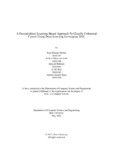| dc.contributor.advisor | Alam, Md. Ashraful | |
| dc.contributor.advisor | Reza, Md Tanzim | |
| dc.contributor.author | Mubin, Kazi Ehsanul | |
| dc.contributor.author | Arthi, Noshin Tabassum | |
| dc.contributor.author | Rahman, Junayed | |
| dc.contributor.author | Rafi, G. M. | |
| dc.contributor.author | Sheja, Tahsina Tanzim | |
| dc.date.accessioned | 2022-12-12T05:35:45Z | |
| dc.date.available | 2022-12-12T05:35:45Z | |
| dc.date.copyright | 2022 | |
| dc.date.issued | 2022-05 | |
| dc.identifier.other | ID: 18101391 | |
| dc.identifier.other | ID: 18101100 | |
| dc.identifier.other | ID: 18101095 | |
| dc.identifier.other | ID: 18101465 | |
| dc.identifier.other | ID: 18101504 | |
| dc.identifier.uri | http://hdl.handle.net/10361/17630 | |
| dc.description | This thesis is submitted in partial fulfillment of the requirements for the degree of Bachelor of Science in Computer Science, 2022. | en_US |
| dc.description | Cataloged from PDF version of thesis. | |
| dc.description | Includes bibliographical references (pages 53-55). | |
| dc.description.abstract | Convolutional Neural Networks (CNN)-based automated approaches are vastly utilised to
anticipate and diagnose cancer, saving time and reducing mistakes. Deep Learning (DL)
CNN methods use a variety of probabilistic and statistical methodologies to make com puters understand and identify patterns in datasets based on previous experiences. We
proposed an efficient federated learning based model to classify histopathological images
for detecting colorectal cancer while providing high prediction accuracy and maintaining
data privacy. Federated learning solves the problem of retaining privacy while utilizing
vast and heterogeneous private datasets collected from numerous healthcare facilities. As
the amount of patient data obtained for the process of machine learning is significantly
responsible for the success of enhancing the accuracy of the system, the experiment was
performed on a large dataset including cancerous and non-cancerous colorectal tissue im ages. FL can also mitigate costs resulting from traditional, centralized machine learning
approaches. We have also applied the XAI method, a model-agnostic approach to acquire
an explicit demonstration of the applied machine learning models. With XAI, we can
visualize the super pixels of our colorectal tissue images through accepting and reject ing features. While applying various CNN models such as VGG16 & 19, InceptionV3,
ResNet50, ResNeXt50, and comparing their precision, ResNeXt50 was established with
the highest accuracy of 99.53%. Therefore, we have applied ResNeXt50 on FL that brings
forth the accuracy of 96.045% and F1 Score is 0.96. | en_US |
| dc.description.statementofresponsibility | Kazi Ehsanul Mubin | |
| dc.description.statementofresponsibility | Noshin Tabassum Arthi | |
| dc.description.statementofresponsibility | Junayed Rahman | |
| dc.description.statementofresponsibility | G. M. Raf | |
| dc.description.statementofresponsibility | Tahsina Tanzim Sheja | |
| dc.format.extent | 55 Pages | |
| dc.language.iso | en_US | en_US |
| dc.publisher | Brac University | en_US |
| dc.rights | Brac University theses are protected by copyright. They may be viewed from this source for any purpose, but reproduction or distribution in any format is prohibited without written permission. | |
| dc.subject | Federated Learning | en_US |
| dc.subject | XAI | en_US |
| dc.subject | Deep Learning | en_US |
| dc.subject | Colorectal Cancer | en_US |
| dc.subject | Convolutional Neural Network | en_US |
| dc.subject | Image Classification | en_US |
| dc.subject | ResNeXt50 | en_US |
| dc.subject.lcsh | Artificial intelligence | |
| dc.subject.lcsh | Machine learning | |
| dc.title | A decentralized learning-based approach to classify colorectal cancer using Deep Learning Leveraging XAI | en_US |
| dc.type | Thesis | en_US |
| dc.contributor.department | Department of Computer Science and Engineering, Brac University | |
| dc.description.degree | B. Computer Science and Engineering | |

